
PHYTOPARASITICA
Scope & Guideline
Unveiling the Secrets of Plant-Parasitic Interactions.
Introduction
Aims and Scopes
- Integrated Pest Management (IPM):
The journal emphasizes research on integrated pest management strategies that combine biological, chemical, and cultural methods to control pests and diseases in agricultural systems. - Plant-Pest Interactions:
A core focus is on understanding the interactions between plants and pests, including the mechanisms of resistance in plants against pest attacks and the ecological dynamics of these interactions. - Biological Control Agents:
Research on biological control agents, such as parasitoids, predators, and microbial agents, is a significant area of interest, exploring their potential in sustainable pest management. - Molecular and Biochemical Studies:
The journal publishes studies that employ molecular and biochemical techniques to investigate pest resistance, plant responses to stress, and the efficacy of biopesticides. - Ecological and Environmental Factors:
Research examining how ecological factors, including climate change and land management practices, influence pest populations and their management is a key area of exploration.
Trending and Emerging
- Sustainable and Eco-Friendly Pest Management Techniques:
There is a growing trend towards research on sustainable pest management practices, including the use of biopesticides, organic farming techniques, and integrated pest management. - Impact of Climate Change on Pest Dynamics:
Recent studies increasingly focus on the effects of climate change on pest populations, emphasizing the need for adaptive management strategies in changing environmental conditions. - Microbial and Plant-Based Biopesticides:
Research on the development and application of microbial and plant-based biopesticides is gaining momentum, highlighting their potential as alternatives to synthetic chemicals. - Genetic and Genomic Approaches to Pest Resistance:
There is an emerging interest in utilizing genetic and genomic tools to understand and enhance pest resistance in crops, enabling the development of more resilient plant varieties. - Interactions between Invasive Species and Native Ecosystems:
Emerging research themes include the study of invasive pest species and their impact on native ecosystems, as well as strategies for managing these invasions.
Declining or Waning
- Traditional Chemical Control Methods:
There has been a noticeable decrease in publications focusing on conventional chemical pesticides as researchers aim to promote more sustainable and environmentally friendly pest management practices. - General Pest Surveys:
While pest surveys were once a common theme, there is a waning interest in general surveys without a specific focus, as the field moves towards more targeted studies on pest dynamics and management. - Insecticide Resistance Mechanisms:
Although still relevant, the frequency of studies solely dedicated to insecticide resistance mechanisms has declined, possibly due to a shift towards integrated approaches that encompass broader ecological interactions.
Similar Journals

Arthropod-Plant Interactions
Exploring the intricate dance of life between arthropods and plants.Arthropod-Plant Interactions, published by SPRINGER, is an esteemed journal dedicated to the interdisciplinary study of the complex interactions between arthropods and plants. With an ISSN of 1872-8855 and E-ISSN of 1872-8847, this journal has been nurturing academic dialogue since its inception in 2008, boasting a projected convergence period extending to 2024. As a reputable source in the fields of Agronomy, Ecology, and Insect Science, it holds a commendable Q2 ranking across multiple categories, reflecting its significant impact in fostering research and knowledge dissemination. Situated in the Netherlands, the journal emphasizes rigorous peer-reviewed articles that contribute to our understanding of ecological relationships and evolutionary dynamics. Currently available through traditional access options, Arthropod-Plant Interactions serves as an essential platform for researchers, professionals, and students alike, offering insights that are critical for advancing both theoretical knowledge and practical applications in agricultural and ecological practices.

PHYTOPROTECTION
Pioneering Solutions for Agricultural ChallengesPHYTOPROTECTION is a distinguished academic journal dedicated to the field of plant protection, published by the Quebec Society for the Protection of Plants. With an ISSN of 0031-9511 and an E-ISSN of 1710-1603, it serves as a platform for researchers, professionals, and students focused on the latest advances in plant protection methodologies, pest management, and sustainable agricultural practices. Although the journal's coverage in Scopus has been discontinued since 2010, its past publications encompass a wealth of valuable research from 1993 to 1994 and from 1996 to 2010, making it a crucial resource for those investigating plant health. The journal firmly positions itself as a fundamental contribution to the advancement of agricultural science, emphasizing research that addresses both contemporary challenges and future trends in the protection of plant resources.
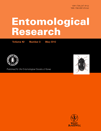
ENTOMOLOGICAL RESEARCH
Innovating Pest Management Strategies through ResearchENTOMOLOGICAL RESEARCH, published by Wiley, is a prominent journal within the field of Insect Science, with a significant focus on advancing our understanding of entomological studies, including pest management, biodiversity, and ecological impacts of insects. Since its inception in 2007, the journal has served as a vital platform for researchers and practitioners to publish high-quality, peer-reviewed articles that contribute to the growing body of knowledge in this essential discipline. With an H-index illustrating its citation impact and its classification in the 2023 Scopus quartile rankings at Q3, ENTOMOLOGICAL RESEARCH ranks 69 out of 181 journals in its field, positioning itself within the 62nd percentile, which underscores its relevance and contribution to agricultural and biological sciences. Although it does not offer Open Access, the journal remains committed to ensuring that its content reaches the widest possible audience, supporting ongoing discoveries and innovations in insect science. For researchers, professionals, and students seeking to remain at the forefront of entomological advancements, ENTOMOLOGICAL RESEARCH is an indispensable resource.
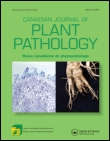
CANADIAN JOURNAL OF PLANT PATHOLOGY
Fostering innovation in the realm of plant health and pathology.Canadian Journal of Plant Pathology, published by Taylor & Francis Inc, is a leading academic journal dedicated to advancing the field of plant pathology, with a significant focus on the interplay between plant health and environmental factors. Established in 1979, this journal has established a reputation for high-quality research, currently holding a commendable impact factor within its category. As of 2023, it ranks in the Q2 quartile for both Agronomy and Crop Science as well as Plant Science, highlighting its importance and influence in these domains. With an impressive ranking of 142/516 in Plant Science and 115/406 in Agronomy and Crop Science according to Scopus, the journal is positioned within the 72nd and 71st percentiles, respectively. The Canadian Journal of Plant Pathology serves as a vital platform for researchers, professionals, and students aiming to contribute to the understanding of plant diseases, fostering innovation and development in agricultural practices.
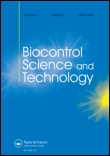
BIOCONTROL SCIENCE AND TECHNOLOGY
Exploring Cutting-Edge Research in Biocontrol ScienceBIOCONTROL SCIENCE AND TECHNOLOGY is a premier, peer-reviewed journal published by Taylor & Francis Ltd that specializes in the dynamic fields of Agronomy and Insect Science. Established in 1991, this journal has garnered a reputation for disseminating high-quality, impactful research with an impressive 2023 Scopus rank of 53 out of 181 in Insect Science and 153 out of 406 in Agronomy, placing it in the Q2 category for both fields. With its ISSN 0958-3157 and E-ISSN 1360-0478, the journal serves as a vital resource for researchers, professionals, and students dedicated to advancing understanding and innovation in pest management and biocontrol strategies. Although not an open-access journal, it offers comprehensive insights that are crucial for professionals aiming to tackle agricultural challenges and enhance food security. The journal’s continuous coverage from 1991 to 2024 ensures that it remains at the forefront of significant advancements in biocontrol, making it an essential read for anyone interested in sustainable agricultural practices and integrated pest management.

ENVIRONMENTAL ENTOMOLOGY
Delving into the Ecological Impact of Insect LifeENVIRONMENTAL ENTOMOLOGY, published by Oxford University Press, is a premier academic journal dedicated to advancing the field of entomology through the lens of environmental science. With the ISSN 0046-225X and E-ISSN 1938-2936, this journal has been a pivotal platform since its inception in 1973, currently converging until 2024. Recognized within the Q2 and Q1 category quartiles, it holds a prominent position, ranking 41st in Insect Science and 225th in Ecology, Evolution, Behavior and Systematics, showcasing its impact and relevance in the scientific community. The journal encompasses a broad scope, covering critical topics related to the interplay of insects and their environments, making it an essential resource for researchers, professionals, and students interested in ecological dynamics and insect biology. Although it does not provide open access, the research published here is vital for those striving to enhance their understanding of ecological systems and the vital roles insects play therein.
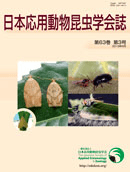
JAPANESE JOURNAL OF APPLIED ENTOMOLOGY AND ZOOLOGY
Empowering Entomological Discoveries for a Greener FutureJapanese Journal of Applied Entomology and Zoology is a premier publication in the field of Insect Science, offering a platform for researchers and practitioners to share their findings on applied entomology and zoology. Established in 1957 and published by the Japan Society of Applied Entomology and Zoology, this journal aims to foster the understanding of insect-related studies that impact agriculture, ecology, and biodiversity. With an ISSN of 0021-4914 and E-ISSN of 1347-6068, it serves as a crucial resource for both academics and industry professionals. While the journal currently resides in the Q4 category of the Scopus ranking for Insect Science with a percentile of 11th, it plays a significant role in providing valuable insights into insect behavior, systematics, and their ecological roles. Readers can benefit from its published research to drive innovations and solutions in pest management and conservation practices. As the journal continues to evolve, it reinforces its commitment to disseminating critical research that supports sustainable practices in entomology and zoology through its convergence extending to the year 2024.
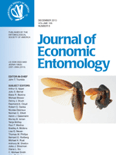
JOURNAL OF ECONOMIC ENTOMOLOGY
Innovating Insights for Agricultural and Ecological ProgressJOURNAL OF ECONOMIC ENTOMOLOGY, published by OXFORD UNIV PRESS INC, stands as a premier interdisciplinary platform for researchers and professionals in the realms of entomology and ecological sciences. With a robust publication history dating back to 1945, this esteemed journal has consistently maintained its reputation for disseminating high-quality research, as evidenced by its prestigious Q1 rankings in both Ecology and Insect Science for 2023. The journal’s impact is highlighted by its excellent Scopus ranks, placing it in the top percentile of Agricultural and Biological Sciences and Environmental Science categories. Aimed at advancing the understanding of insects and their relationships with humans and ecosystems, the JOURNAL OF ECONOMIC ENTOMOLOGY offers a critical forum for original research articles, reviews, and opinion pieces that influence practices in pest management, conservation, and agricultural productivity. Although not an Open Access journal, its findings are pivotal for students, researchers, and professionals striving to address contemporary challenges in entomology and beyond.

NEMATROPICA
Pioneering Research in the World of NematodesNEMATROPICA is a distinguished academic journal dedicated to advancing the field of nematology and its relevance to agronomy and crop science. Published by the Organization of Tropical American Nematologists, this journal serves as a crucial platform for researchers, professionals, and students to disseminate original research and reviews focused on the biology, ecology, and management of nematodes within agricultural systems. With an evolving history since its inception in 1988, NEMATROPICA has consolidated its reputation, currently holding a Q3 classification in Agronomy and Crop Science for 2023, indicating its respected standing within the field. Although the journal is not open access, its valuable contributions underscore the importance of nematodes in ecological interactions and pest management strategies, making it essential reading for those committed to enhancing agricultural productivity and sustainability. The journal's contact address is Auburn University, Department of Plant Pathology, Auburn, AL 36849, United States.
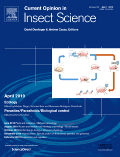
Current Opinion in Insect Science
Advancing the Frontiers of Insect KnowledgeCurrent Opinion in Insect Science is a leading academic journal published by ELSEVIER, dedicated to advancing understanding in the field of insect science. With an impressive impact factor reflected in its top quartile rankings (Q1) within both Ecology, Evolution, Behavior and Systematics and Insect Science, the journal holds a prominent position, ranking 3rd out of 181 journals in Insect Science and 35th out of 721 in Ecology-related fields according to Scopus for 2023. Since its inception in 2014, the journal has provided a dynamic platform for researchers, professionals, and students to explore and share cutting-edge developments and insights, targeting crucial topics in insect biology, ecology, and systematics. Although there are no open access options available, Current Opinion in Insect Science remains an essential resource for those looking to stay at the forefront of their research or academic interests.